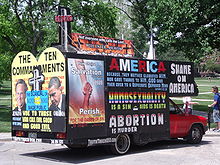Christian right
![]()
This article is about a political current. For religious liberties, see freedom of religion.
![]()
This article or section is still missing the following important information:
Religious rights in Islam, Judaism, Hinduism and Buddhism
Help Wikipedia by researching and adding them.
Religious right refers to a group of people who are politically active in favour of conservatism out of religious conviction. Often this refers to the "Christian right" (politically right-oriented Christians) in the USA, but the term is also applied to the situation in other countries as well as to nationalist Hindus (Hindutva, Sangh Parivar), national-religious and ultra-orthodox Jews, fundamentalist-nationalist Buddhists e.g.: Movement 969 in Myanmar and politically right-wing oriented groups of Buddhist monks in Sri Lanka and Islamists, including right-wing nationalist oriented Islamist movements such as the Gülen movement.

A "Truth Truck" on the campus of Ohio State University.
Antecedent
In 1935, the fundamentalist organization The Fellowship Foundation emerged, calling for a return to "Christian conservative values" in place of the New Deal as a solution to the Great Depression of the time. The organization's goal was an elitist fundamentalism in which society would be controlled by "God-governed" men organized in prayer cells who would not consult the masses in a democratic sense but would be guided by Jesus Christ as he revealed himself to them. The organization known as "The Family" was strictly anti-communist and exerted a strong influence on politics, especially in the 1950s.
Origin and influence
The new Christian right emerged in the United States in the 1970s through cooperation between neoconservatives and evangelical fundamentalist clergy and televangelists such as Jerry Falwell and Tim LaHaye. Presbyterian pastor Francis Schaeffer was a major influence on later central players in the Christian Right. The Christian right in the U.S. is also recruited in small part from conservative Catholics. A prominent face of the Catholic right is Republican Rick Santorum, who ran unsuccessfully as a candidate in the party's presidential primaries in 2012 and 2016.
In the early 1990s, the Christian right began to organize itself much more as a "political" movement. Instead of clergy and preachers, lawyers and politicians took on leadership roles. Key strategies during this phase included building right-wing think tanks and infiltrating and subverting the Republican Party and electoral support for Republican candidates. For example, George W. Bush received about one-third of his votes from religious rightists. Supreme Court decisions are decisively influenced by the religious right. Justices who are close to or belong to the religious right make significantly more conservative decisions on sex discrimination and the death penalty than other justices.
The influence of the religious right in the USA temporarily declined in 2008. Young believers in particular are falling away from conservative church leaders. With the election of Donald Trump in 2016, the religious right experienced growing influence in US politics, especially because Vice President Mike Pence holds right-wing evangelical positions. Since Trump himself neither belongs to the Christian Right nor conforms to the ideals of this movement, this is to be seen more as a kind of alliance of convenience.
Since the 2010s, the religious right has gained increasing influence among conservative politicians in Latin America. Mauricio Macri was elected in Argentina in 2015 and Sebastián Piñera in Chile in 2017, but the election of Jair Bolsonaro in Brazil in 2018, who was influenced by evangelical fundamentalists, marked a break in the otherwise Catholic country.
More recently, eschatologically based support for an intransigent Israeli policy toward the Palestinians and its other neighbors is also found as a theme of agitation among these groups. (→ Christian Zionism)
Questions and Answers
Q: What is the Christian right?
A: The Christian right is a name for right-wing Christian political and social movements that support conservative social and political ideas, usually based on the belief that the United States was founded on a strong belief in God and American laws should be based on what is in the Bible.
Q: Who are members of the Christian right?
A: Members of the Christian right can be from any branch of Christianity, including Catholicism, but it is most often used with Evangelical Christians, Fundamentalists (such as Born-agains) and Mormons.
Q: How many Americans identify as part of the religious or Christian right?
A: About 15% of Americans say they are part of the religious or Christian right.
Q: When did people start using religion for conservative politics in America?
A: People have used religion in politics for thousands of years, and people in the United States have used religion for conservative politics in America for hundreds of years. For example, those who wanted a conviction in the Scopes trial were largely Democrats which would later be called "the religious right". However, the term first came into use in 1970s.
Q: Who was one of first to use "religious right"?
A: Jerry Falwell was one of first to use "religious fight". He felt that country and institutions were run by left-wing intellectuals who did not believe in God.
Q: What is often referred to as “the culture wars”?
A:The fight between left-wing intellectuals and religious rights is often referred to as “the culture wars”.
Q: Which presidents have been elected due to support from religious rights?
A:Presidents Ronald Reagan, George H W Bush and Donald Trump were elected due to support from religious rights.
Search within the encyclopedia